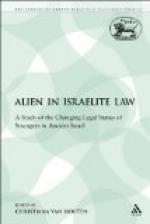|
This section contains 2,779 words (approx. 10 pages at 300 words per page) |

|
In ancient Israel, laws were regarded as divinely ordained. The upholding of the laws, therefore, devolved upon the state, the religious establishment, and the people. Although the state could, presumably, impose sanctions for breaches of law, most cases were decided on the local level, and punishment was executed by the people as a whole (as in stoning), by the family of the victim (as in cases of murder), and by God.
Jurisdiction
There were several different strands of jurisdiction and authority in ancient Israelite law. Priests were in charge of religious matters, which included the important determination of secular and profane, pure and defiled (Lv. 10:10, Ez. 44:23; cf. Dt. 33:10). They oversaw the expiation of those misdeeds that could be expiated (Lv. 5:1–13; see below); they were involved in the trial of false witnesses; and they were members of the superior court envisioned in Deuteronomy...
|
This section contains 2,779 words (approx. 10 pages at 300 words per page) |

|



